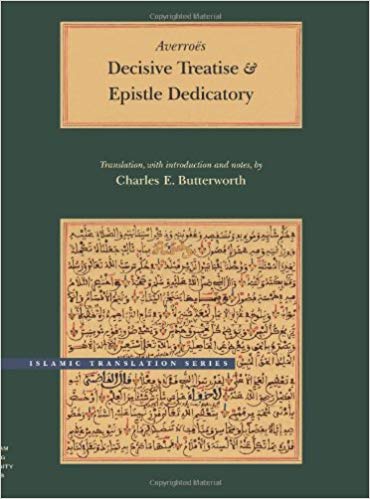
Having completed our reading of the twelfth-century Andalusian philosophical fable that is at the center of Lenn Evan Goodman, Ibn Tufayl’s Hayy ibn Yaqzan: A Philosophical Tale (Chicago and London: The University of Chicago Press, 2009), my Middle East Studies (Arabic) 467R class — also known as Philosophy 360R — has turned to Charles E. Butterworth, ed. and trans., Averroës: Decisive Treatise and Epistle Dedicatory (Provo: Brigham Young University Press, 2002).
We published the two essays, Decisive Treatise and Epistle Dedicatory, in their original Arabic, accompanied by a translation and a significant introductory essay by Charles Butterworth, an internationally distinguished (and internationally trained) scholar at the University of Maryland who was, at the time, the president of the Société Internationale d’Histoire des Sciences et de la Philosophie Arabes et Islamiques / International Society for the History of Arabic and Islamic Sciences and Philosophy.
Here is the online description of the original author and of the book from the University of Chicago Press website:
Averroës (Ibn Rushd, 1126-1198) emerged from an eminent family in Muslim Spain to become the first and last great Aristotelian of the classical Islamic world; his meticulous commentaries influenced Christian thinkers and earned him favorable mention (and a relatively pleasant fate) in Dante’s Divina Commedia. The Book of the Decisive Treatise was and remains one his most important works and one of history’s best defenses of the legitimate role of reason in a community of faith. The text presents itself as a plea before a tribunal in which the divinely revealed Law of Islam is the sole authority; Averroës, critical of the anti-philosophical tone of the Islamic establishment, argues that the Law not only permits but also mandates the study of philosophy and syllogistic or logical reasoning, defending earlier Muslim philosophers and dismissing criticisms of them as more harmful to the Islamic community than the philosophers’ own views had been. As he details the three fundamental methods the Law uses to aid people of varied capacities and temperaments, Averroës reveals a carefully formed and remarkably argued conception of the boundaries and uses of faith and reason.
Ibn Rushd or Averroës makes a very clearly-reasoned argument, just as one might expect from an author who was not only arguably the greatest Aristotle commentator of the medieval period but an influential judge and legal thinker. I’ve taught the text previously, including once in Arabic, and I’m happy to be back to it this semester.












